
views
Choosing a Topic

Look back on mementos you kept from the summer. If you kept any souvenirs from your summer vacation — like pictures, plane tickets, or a diary — use these to help you with your essay. Looking back on your mementos will help you remember details from your summer, making writing the essay much easier. These can also make nice visual aids if you are asked to present your essay.
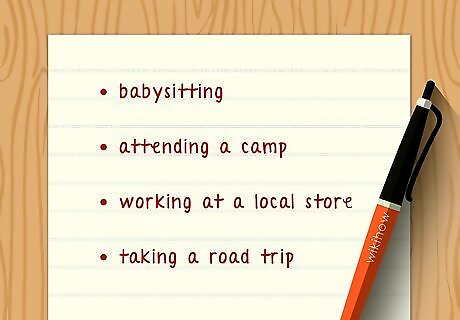
Make a list of the things you’ve done over summer vacation. When trying to write an essay on your summer vacation, it’s helpful to first write a list of the things you did. Once you create a list, it’ll be easier to remember specific details about each event or moment. Start from the beginning of the summer and brainstorm all of the things you did. A list might be full of things like babysitting, attending a camp, working at a local store, taking a road trip, etc. This type of brainstorming can help you pick major events and other important moments from your summer.
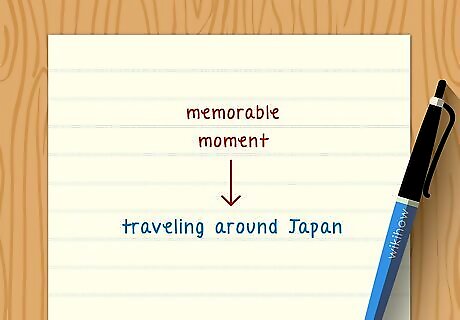
Write about a memorable moment. It’s going to be difficult to talk about everything you did over summer vacation, so try to narrow in on one moment. The moment doesn’t have to be super exciting or full of action, it just needs to be important to you. For example, maybe you spent your summer traveling around Japan. Think of a memorable moment you had while traveling — maybe you walked up a mountain in the pouring rain — and write about this moment, adding lots of details.
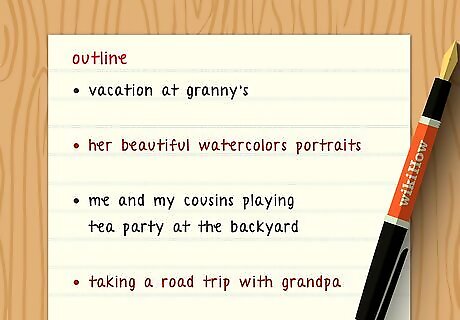
Create an outline for your essay. Once you've picked the specific moment you want to talk about, write down the details of this moment. Organize your ideas by putting them in order of how you're going to write about them. For example, if you're writing about spending time at the beach, your outline could remind you to talk about the sandcastle building contest you entered, the dolphins you saw, and the ice cream you ate every day. Details might be what the other sandcastles looked like, how far away the dolphins were, and what kind of toppings were on your ice cream. Your outline is just to help you organize your thoughts — it can be written by hand or typed.
Crafting the Essay
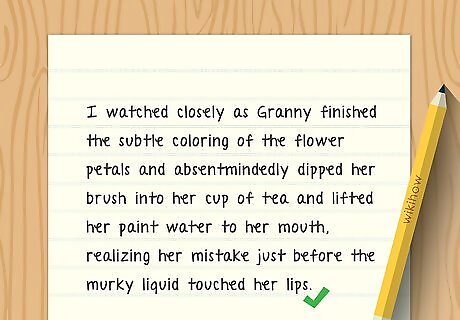
Focus on your feelings, interactions, and thoughts. Your essay shouldn’t just be a summary of things that you did. Think about how you felt while doing those things, who you interacted with, or what you thought during that time. This will make your essay much more meaningful. Instead of saying that you worked in a pet store, ate a PB&J sandwich, and walked home every day, talk about more than just your actions. You could talk about which pets are your favorites to work with, how it felt to eat the same sandwich every day, or what you thought about on your walk home.

Use your 5 senses to explain your experiences. As the saying goes — show, don’t tell. Instead of simply stating things that happened, use your 5 senses to make your writing more interesting. Describe how things tasted, sounds you heard, what things looked like, and so on. Using sensory details like these will help your readers visualize and engage with your writing. These help your audience make your experiences feel real to them, even though they weren't there.
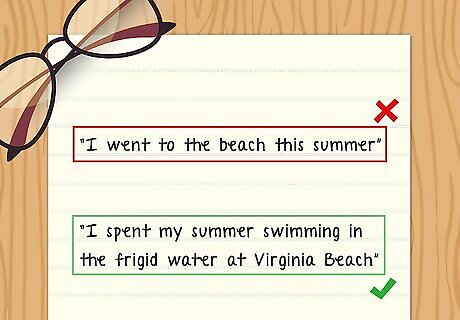
Describe activities you did in each place you went. Instead of saying broad statements about things you did over summer vacation, give as many details as possible. Being specific will allow your reader to picture in their head what it is you’re talking about, and it takes your writing to the next level. For example, instead of saying “I went to the beach this summer,” try saying “I spent my summer swimming in the frigid water at Virginia Beach.” The more details you can provide, the more engaged your reader will be.
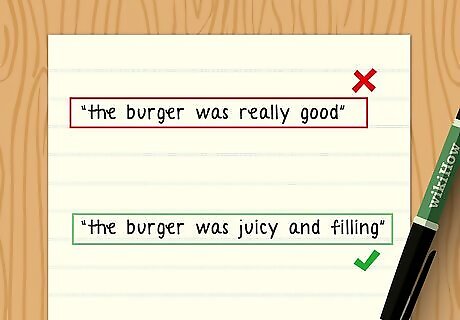
Choose precise, descriptive adjectives. Choosing words that describe what you’re talking about in a detailed way will make your essay even better. Avoid boring adjectives such as “good” or “really” and replace them with better descriptive ones. Instead of saying “the burger was really good,” you could say, “the burger was juicy and filling.”

Revise and edit your essay carefully. Once you think you’ve finished your essay, put it away for a little while — this could be a couple hours or a few days — before starting to revise it. Make sure it flows smoothly and the wording makes sense. Check for grammar and spelling mistakes, rereading it thoroughly. Don't just rely on spellcheck. It will help catch some errors, but it will miss some things, too. Ask a parent or other adult to read over your essay too, if you'd like. Setting your essay aside for a little while will give you a fresher perspective when you go back to revise it.
Structuring Your Essay
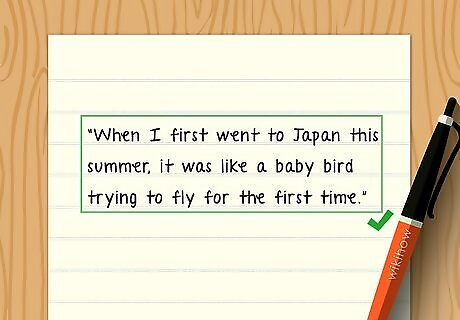
Start with a strong introduction. Your introduction should pull the reader into your essay while giving them a general idea as to what the essay will be about. Use the introduction to set the time and place of the event or moment you’ll be talking about, giving the reader background information.
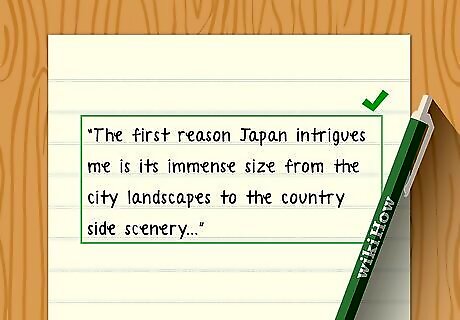
Use your body paragraphs to talk about your moment. Your body paragraphs, whether you write 1, 2, or 3, should be used to talk about your chosen summer event or moment. This is where you go into detail and explain what happened so that the reader can visualize your summer vacation.

Write a conclusion that explains the purpose of the moment. Your conclusion is where you wrap up the summer vacation essay. Explain why you chose to write about the specific moment, or what you learned from the experience. Make sure your conclusion doesn’t just copy the introduction.














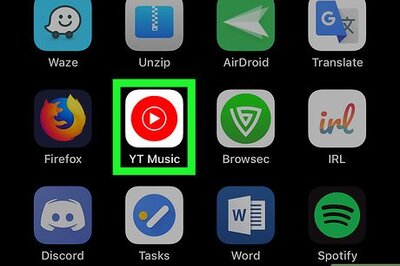





Comments
0 comment